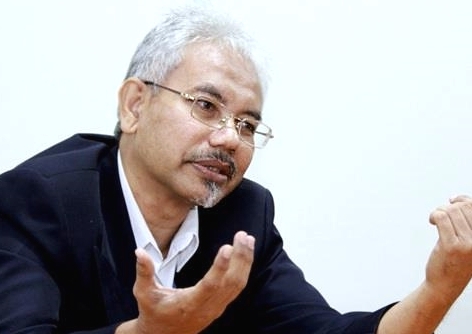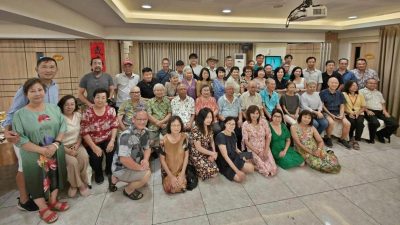
By Professor Dr. Mohd Tajuddin Mohd Rasdi
As a student at the University of Wisconsin, Green Bay, I was introduced to the majestic buildings purportedly built for the glory of God from my art and architectural history courses.
In these courses, the world of a simple Malay boy from a cramped police flat in Butterworth and Taiping, there was laid open to me the great Gothic cathedrals of Christianity, the splendid monumental style of Ottoman mosques and the intricate and massive Hindu temples of India. All…for the glory of God, I was told and taught.
Now, as a professor of architecture I am no longer at awe of these great edifices with their structural prowess of stone because I am mostly sad, disappointed and cynical at the message of religion and religious piety. To me, most of these mosques, temples and cathedrals of the past and many of the present are nothing more than a symbol of political power, of human vanity and a symbol of social elitism in society.
These buildings do not symbolise to me the glory of God but more the destitution of religion of its original and simple message of spirituality.
In this column, I propose to deal with the question of why must there be many homeless and poor people when there is also a great many mosques, temples and churches that some of it costing hundreds of million ringgit to build.
At a time when the pandemic is redefining the very fabric of society, economics and politics, the virus has made me ask basic and simple questions to the great religions of old; what is the true meaning of religious spirituality?
From my readings, I have come to understand that spirituality is only concerning two basic things. However, society, politics and vanity have added two more items to it that to me is antithesis to the two basic elements of spirituality. In order to be at one with God, man must humble his selfish desires, his self ego and social identity. If not, he would be more 'superior' than God.
Now, the important question is, how does he subjugate the self ego that is centred about selfish concerns? The answer is…to help others with compassion, kindness, sharing of wealth and sustenance. That's all.
The other methodology was the act of religious worship or ritual prayers to humble the self and remind of the greatness of God. All is fine until man decide to add two more things to this act of 'self' destruction; an architectural identity and a social classification.
An architectural identity is said to be necessary for 'God' even though 'God' does not need a house or shelter like the homeless and poor human beings. God, it is said need the glory of height in the tall spires of churches, minarets and stupas. God also does not crave or need an acknowledgement of social standing like a politician with an expensive Mercedes Benz or a woman with a Birkin bag.
A social classification is a group identity that makes this group 'different' than 'the others'. This social construct and identity creates a divisiveness between people that is non-existence in the purity of all religions. Thus, religion becomes a birthright, a social status, a group identity and a political force of might.
Religion presently has no sense of simple piety of helping the poor and the homeless as its core business as a gateway to God. This gateway is now replaced by expensive pilgrimage packages, hundred million ringgit buildings of worship and a social and elite club of 'pious people'.
I read somewhere that in Kuala Lumpur alone, there are 1,500 homeless people. When I Google houses of worship, I counted 120 mosques, temples, churches and gurdwaras. I have also read that DBKL is seeking to build some homeless shelters. I read also that some corporate and NGOs are feeding the poor.
Kudos to all of them for their acts of real religious piety. What I have not read is why houses of worship cannot be a shelter to all of these homeless people. I told my wife, if each house of worship were to shelter 10 homeless persons, we would be able to help 1,200 of them. Assuming each house of worship has a congregation of 400 people, one person need to spend only RM50 to feed all 10 persons two full meals a day of simple rice, vegetables and eggs. I can even make nasi goreng with half a chicken and six cups of rice. Each congregant would need to contribute one act of charity in one single year.
With thousands of houses of worship, it seems to me that religion will never have any meaning as long as there is the homeless and the poor. Ten people need only 200 square feet of roofed and walled space at a corner of a mosque, temple, church or gurdwara. I know that gurdwaras have the 'langgar' ritual where food is cooked every day for whoever comes to eat. Mosques cook only 30 days during Ramadhan but often have feasts to feed the already fed. Churches have their soup kitchens and these are noble deeds indeed.
The mosque of the Prophet Muhammad has a space called the 'Suffa' space where the homeless reside. The homeless learn from the Prophet directly and perform odd jobs for the mosque upkeep. The Prophet would share any food given to him with all the suffa people. In the great Islamic cities of the past there are no homeless as there are mosques, madrasa, caravenserai for people to sleep in safely.
Food is in abundance as congregants who come to prayers would take turns preparing food for the 'guests of Allah' at the mosque. I actually experienced this when I was 25 years old with my first job. I slept on alternate nights at the Subang Jaya Mosque along with a young draftsman who had to vacate his apartment because his architectural firm had not paid his salary for 6 months. The other three occupants were Tabligh members in transit. We slept at the mosque and someone would always donate food for us at night. I slept there because my wife and child were in Kajang and I worked in Subang Jaya and I wanted to save the RM8 journey to work by going to work one morning and returning home the next night. Luckily I did that for only one month and when I received my first salary, I moved my family to the fourth floor of a low cost housing flat in Subang Jaya.
How I wish that religion would return to its simple message and methodology of spiritual piety and not waste money on grand gestures of architectural monumentality and selfish acts of political aggression. We Malaysians would not need any prihatin package from the government if we understood our real purpose in spirituality which is the act of charity, love and compassion for those who are less fortunate than us.
I have learned, as an academic and as a seeker of divine acceptance, the bigger the houses of worship, the greater the number of these buildings of God and if there is an equal great number of homeless and the poor uncared for, there is very little religious truth in society. Thus, for the sake of our nation, society and our very souls, we should open our houses of God to those that are in real need of a home toward our collective spiritual destiny.
(Professor Dr. Mohd Tajuddin Mohd Rasdi is Professor at a local university.)
ADVERTISEMENT
ADVERTISEMENT


































